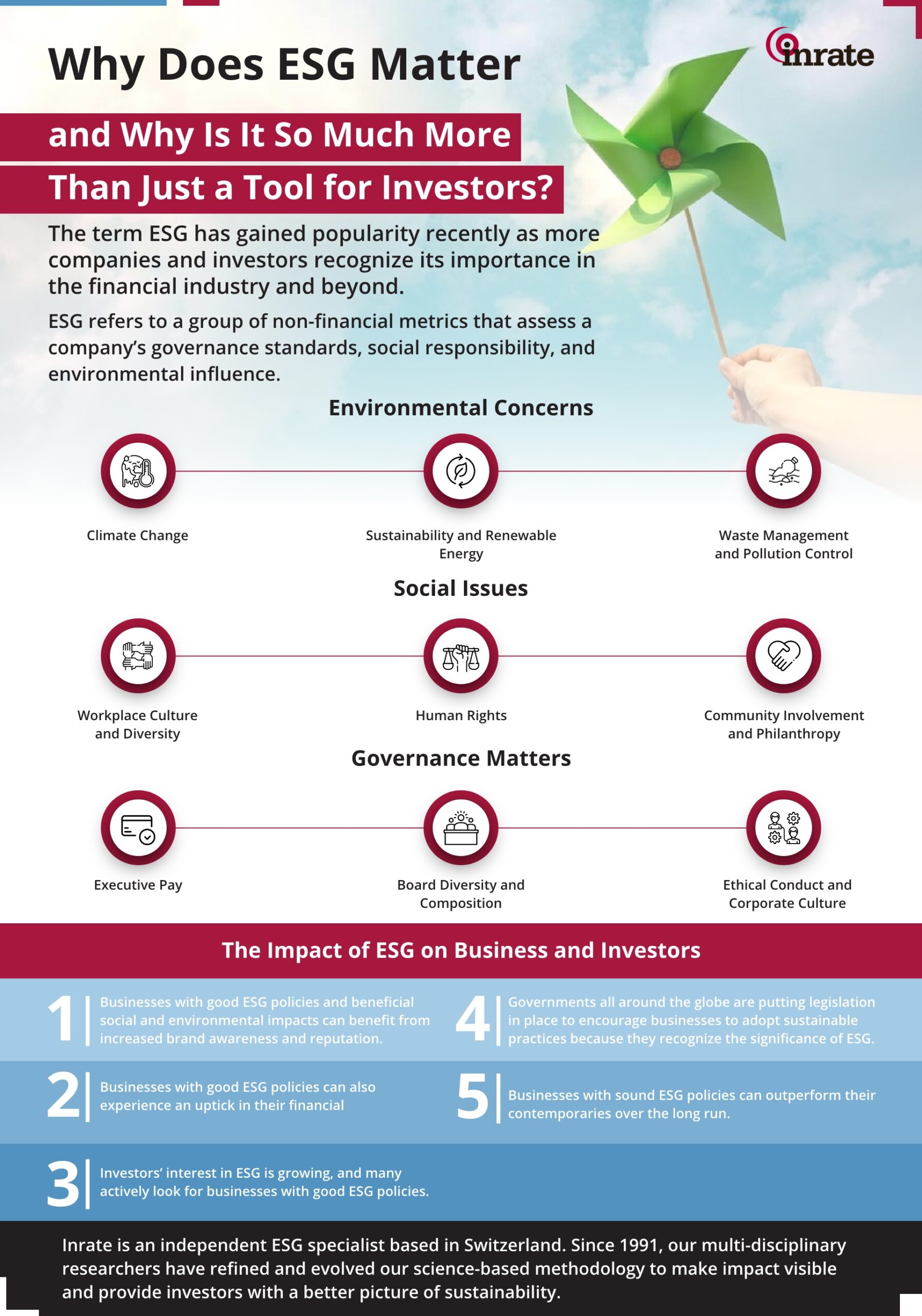The term ESG has gained popularity recently as more companies and investors recognize its importance in the financial industry and beyond. ESG refers to a group of non-financial metrics that assess a company’s governance standards, social responsibility, and environmental influence. ESG is becoming more popular as people become more conscious of the need to address how corporate operations affect people and the environment.
Investors used to make investment decisions solely based on financial criteria. However, the game has changed with the acknowledgement of ESG variables as crucial predictors of a company’s long-term performance and sustainability. For investors who want to make wise choices today, not just in terms of financial returns but also in terms of having a good influence, ESG considerations are crucial.
ESG is far more significant than merely a tool for investors. ESG elements have emerged as important determinants of brand reputation, and consumer loyalty as businesses are held more accountable for their impact on the environment and society. Businesses must comprehend and incorporate ESG issues into their operations and strategies, given the growing importance of ESG.
In this blog post, we will explore ESG and why it is important to investors more than simply as an investing tool. We’ll go through the numerous ESG factors that explain why ESG is important to investors and companies and why ESG is so important for building a sustainable future for everyone.
Environmental Concerns:
The environmental aspect of ESG concerns how a company affects the environment and its efforts to lessen that effect. This covers waste management, pollution prevention, renewable energy, sustainability, and climate change.
- Climate Change: Companies are being held responsible for contributing to this widespread issue since it is one of today’s most pressing environmental challenges. Fossil fuel use, deforestation, and other activities have increased greenhouse gas emissions, which have raised Earth’s temperature. Investors are searching for businesses with a defined strategy for lowering their carbon footprint and are moving toward a low-carbon economy.
- Sustainability and Renewable Energy: Businesses may show their dedication to the environment and communities by implementing sustainable practices, such as more efficient energy usage. A crucial component of sustainability is renewable energy, and investors seek businesses to invest in innovative ways to produce clean energy.
- Waste Management and Pollution Control: Businesses must also take action to control pollution and manage their waste. This covers the installation of efficient waste management systems and the safe disposal of hazardous materials. Businesses that don’t properly manage their trash and control pollution risk damaging the environment and suffering severe financial and reputational repercussions.
Companies must consider the environmental aspect of ESG since it impacts their reputation, financial performance, and the condition of the environment. Investors are becoming increasingly conscious of the significance of ESG for investors. They seek out businesses making efforts to reduce their environmental impact and advance sustainability.

Social Issues:
The social aspect of ESG focuses on how an organization affects society, especially its employees, clients, and the communities in which it works. This covers workplace diversity and culture, human rights, and community participation.
- Workplace Culture and Diversity: Businesses must foster an environment that values and supports every employee. This entails encouraging equal opportunity and diversity and fostering a secure and healthy workplace. Investors are searching for businesses dedicated to fostering an inclusive and varied workplace and are taking action to resolve any concerns connected to diversity or culture.
- Human Rights: Businesses must uphold and defend the rights of all people, especially employees and local communities. This covers topics including discrimination, human trafficking, and fair work practices. Companies that violate human rights risk severe financial loss, harm to their brand, and perhaps legal action.
- Community Involvement and Philanthropy: Businesses must also be involved in their communities by funding regional projects and promoting the welfare of the local population and the areas in which they conduct business. This covers charitable endeavors, community involvement programs, and ethical corporate practices that advance the social, economic, and environmental well-being of the society in which they conduct business.
Companies must consider the social aspect of ESG since it influences their reputation, employee happiness, and connections with consumers and communities. Investors are searching for businesses dedicated to having an excellent social effect as they become more aware of the significance of ESG.
Governance Matters
A company’s management and leadership styles, as well as its general corporate culture and ethics, are the focus of the governance part of the ESG framework. It covers matters including executive pay, board composition, and moral conduct.
- Executive Pay: Businesses must treat their executives fairly and transparently when determining their salaries. This involves ensuring executive compensation is aligned with market norms and the organization’s success. Investors seek out businesses that pay their executives at reasonable rates and take action to resolve any pay-related problems.
- Board Diversity and Composition: Businesses must have a well-functioning and diverse board of directors. This entails having the right amount of independence and a balance of knowledge, experience, and variety. Investors seek businesses that address board-related concerns and have a diverse and productive board.
- Ethical Conduct and Corporate Culture: Businesses must also foster a strong culture and encourage their staff to act ethically and responsibly. This entails adhering to rules and regulations and resolving potential ethical or cultural difficulties. Businesses that don’t uphold strong ethical standards risk suffering substantial financial and reputational losses.
Companies must consider the governance component of ESG since it impacts their reputation, financial performance, and overall accountability. Investors are becoming increasingly aware of the significance of ESG and are searching for businesses with solid governance processes and a dedication to moral and responsible behavior.
Why ESG Matters: The Impact of ESG on Business and Investors

In recent years, ESG has grown in importance, and its implications may be observed in a variety of business and financial contexts. Here are a few reasons ESG is important to investors:
- Reputation: Businesses with good ESG policies and beneficial social and environmental impacts can benefit from increased brand awareness and reputation. Increased consumer loyalty, employee involvement, and favorable media publicity are possible outcomes.
- Financial Performance: Businesses with good ESG policies can also experience an uptick in their financial performance. This may happen due to lower expenses, more efficiency, and improved risk management. Companies with good ESG policies may also be valued better and attract more investment funding.
- Investor Demand: Investors’ interest in ESG is growing, and many actively look for businesses with good ESG policies. This demand for ESG investments stems from two factors: a desire for ethical investing and an understanding of the possible financial advantages of ESG.
- Regulation: Governments all around the globe are putting legislation in place to encourage businesses to adopt sustainable practices because they recognize the significance of ESG. This covers laws concerning corporate governance, sustainability, and climate change, as well as tax breaks for businesses that use ESG practices.
- Market Outperformance: According to research, businesses with sound ESG policies can outperform their competitors over the long run. This is so that companies may improve their financial performance by identifying and managing risks and opportunities with the aid of ESG factors.
The above points explain how important ESG is to investors and how it has a considerable and expanding influence on businesses and investors. A company’s reputation, financial performance, employee happiness, and access to more investment resources may improve when ESG is prioritized. ESG investors stand to gain from ethical investment and ESG’s potential financial rewards. ESG is becoming increasingly significant; thus, businesses and investors must recognize its relevance and take action to incorporate ESG into their operations and financial decisions.

ESG Beyond Investment: A Holistic Approach
ESG has traditionally been viewed as a tool for investors, but it is now widely acknowledged as a vital part of a company’s strategy and operations. A comprehensive approach to ESG considers how a company’s actions affect the environment, society, and governance, not just from an investment viewpoint but also from a perspective that encompasses a broader range of stakeholders.
- Stakeholder Engagement: As part of a comprehensive ESG strategy, businesses interact with a wide range of stakeholders to better understand their issues, goals, and opportunities. Customers, staff members, suppliers, regulators, and local communities are examples of this. Businesses that approach ESG from the perspective of their stakeholders may forge better bonds, enhance their reputations, and generate value that all parties share.
- Supply Chain Management: Businesses may also think about the ESG effects of their supply chains and aim to advance ethical behavior down the chain. This entails evaluating suppliers, establishing sustainability targets, and collaborating to enhance performance over time.
- Environmental Footprint: A comprehensive approach to ESG includes minimizing a company’s environmental impact, which has cut back on waste, energy usage, and greenhouse gas emissions. To monitor and report on their progress in this area, businesses can utilize sustainability metrics and reporting frameworks like the Global Reporting Initiative (GRI) or the Sustainability Accounting Standards Board (SASB).
- Community Engagement: Businesses may also think about how their activities affect nearby communities and take action to interact with them and aid in their growth. This might involve bolstering neighborhood businesses, putting money into local infrastructure, and encouraging education and training efforts.
A holistic approach to ESG looks at a company’s influence on the environment, society, and governance in addition to investment factors. Companies that address ESG holistically may enhance their brand, forge closer ties with stakeholders, and generate value that benefits everyone. Companies may set themselves up for long-term success by incorporating ESG into their operations and strategy.
In Conclusion-
ESG has become an increasingly essential aspect of business and investment, showing a rising concern for sustainability, responsible practices, and ethical governance. ESG can enhance a company’s reputation, financial performance, and long-term prospects by considering how its actions affect the environment, society, and governance.
Investors are becoming more aware of the value of ESG, and many are looking for businesses with good ESG processes. The financial advantages of ESG investments include better risk management, higher returns, and lower volatility. At the same time, it enables investors to make a difference in the world by matching their investments with their ideals.
A complete evaluation of a company’s influence on the environment, society, and governance is taken as part of a holistic approach to ESG, which goes beyond investment considerations. Businesses may position themselves for long-term success by adopting a stakeholder-centric approach to ESG, engaging with a wide range of stakeholders, lowering their environmental impact, and aiding local communities.
Inrate is a market leader in ESG integration services for investors and businesses. Inrate assists customers in incorporating ESG aspects into their investment decision-making process since it has a thorough awareness of their significance. Get in touch with us to learn more about our ESG integration services and how we can assist you in incorporating ESG considerations into your investing process.





